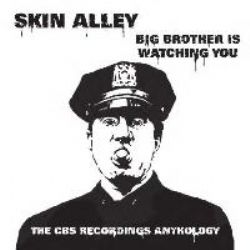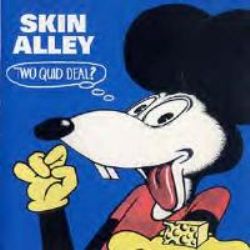In the late sixties London had a flourishing and evolving underground scene with many bands, many clubs where they could play and an audience with an open mind for musical experiments. In the summer of 1969 the new agency Clearwater Productions emerged in West London. This agency signed bands like High Tide, Cochise and Trees, but also Skin Alley, founded in 1968. After some personnel changes the band became professional in the spring of 1969. At that time Skin Alley consisted of Bob James (vocals, guitar, flute, saxophone, Mellotron), Thomas Crimble (vocals, bass), Krysztof Henryk Juskiewicz (vocals, keyboards, Mellotron) and Alvin Pope (drums, percussion). In this expanding music scene competition was hard, especially for bands that didn't have a record deal. In order to gain some notice, Clearwater organized free concerts. This was a good strategy and soon Skin Alley gained a reputation as a 'peoples' band, playing often free concerts. In August 1969 Clearwater organized a series of free concerts at All Saints Hall in Ladbroke Grove. In the last weekend Skin Alley played with High Tide and a new band called Group X, which was later renamed to Hawkwind. In fact this was the very first live appearance of the latter. The event was also attended by BBC DJ John Peel, who invited Skin Alley to record a session for his Radio One show 'Top Gear'. They signed to CBS, and in November 1969 Skin Alley entered the studios to record their first album. The album was produced by Dick Taylor, former lead guitarist of the Pretty Things. In February 1970 they recorded a new track for the release of a single, and in March 1970 both the eponymous LP and the single were released. Skin Alley's debut album was well-received. The music sounded very jazzy and improvised; the guitar only played a minor role which was quite remarkable. The band members mastered many other solo instruments like the piano, Hammond-organ, flute, saxophone and even the Mellotron. The cover of the album was also remarkable showing a policeman. In the summer of 1970 the band started to work on their second album. During these sessions Thomas Crimble left to play with Hawkwind. Nick Graham, former bassist of Atomic Rooster, replaced Crimble playing the bass and flutes. However, before the album was released, Skin Alley received a commission to write and record a soundtrack for a film about the German model Veruschka called Stop Veruschka. It was recorded in two days in November 1970, but both the film and the soundtrack were never released. In December 1970 the second album To Pagham And Beyond came out. It revealed a new direction, drifting more toward blues-rock and early progressive rock and it was more guitar-based than its predecessor. The band sounded more mature now. Where the first album was mainly dominated by solos, the second one sounded more like a band playing together, for they were more experienced due to their frequent live playing. Despite their progression the sales figures failed to exceed those of the debut album, so CBS dropped the band in 1971. Drummer Alvin Pope departed and was replaced by ex- Bronx Cheer drummer Tony Knight. Without a record deal Skin Alley undertook a heavy gigging schedule. They participated at the legendary free gathering at Glastonbury Fayre in June 1971, the first of the free festivals, alongside Grateful Dead, Pete Townshend, David Bowie, Marc Bolan, Hawkwind, The Pink Fairies and Gong amongst others. In 1972 they signed a new contract with Transatlantic Records, a folk label looking for more progressive rock acts. In October 1972 Skin Alley released their third and finest album Two Quid Deal, a continuation and refining of the musical direction of their second album. The album cover was designed by the underground cartoonist Edward Barker and depicted a mouse holding a lump of cheese. The cheese served as a substitute for a marijuana deal to which the album title refers. Two Quid Deal is not only Skin Alley's finest album, but also the best selling album, even though the LP and the single You Got Me Dangling failed to break through the UK charts. However, the album came to the attention of the legendary American soul label Stax, and they made a license agreement with Transatlantic. Thus Skin Alley became the first non-American act signed to Stax. In May 1973 the band made a short American tour including a show in Memphis where they met producer Don Nix. With Nix they recorded their fourth and final album Skintight later that year. The content was a total departure from their progressive roots and had a funkier and more commercial sound. The album was ill-received and it alienated them from their long term fans. Within months the band quit. Only Nick Graham enjoyed a fruitful musical career as a member of Jess Roden And The Humans and later as a professional songwriter for Leo Sayer, Cheap Trick and Jennifer Rush, amongst others. Esoteric Recordings have now re-released all but the last album. The first two albums have been combined on a double- CD, also containing the unreleased Veruschka-album. In fact this album has been released officially for the first time. It's Skin Alley's most daring album, more psychedelic and more diverse than the other albums. That alone makes this re-release worthwhile. The music has been remastered from the original tapes, so the sound is excellent. Skin Alley was a hardworking and sympathetic band, but neither groundbreaking nor essential. Their music is genuine and enjoyable, but sounds also a bit outdated now. These albums are recommended for people who knew the band at the time and for people having an interest in the London underground scene and early progressive rock. *** Erik Gibbels (edited by Peter Willemsen) Where to buy? |

